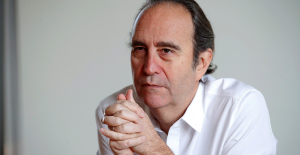In the mid-1980s, when Paul Watzlawick explained to Germans in his “Instructions on Unhappiness” how best to get rid of any joy in life, he based his tips primarily around a bon mot: “I would never become a member of one Want to become a club that I know will accept me as a member,” was the realization that, according to the psychotherapist, opens the door to hell on earth so wide that you can stroll through it with ease.
Watzlawick translates the sentence into "whoever loves me, something is wrong with him" - a strategy that makes any lasting intimate connection with another person impossible. That was extremely exaggerated, but the original quote also shows a clear contempt for oneself, something like: The club members don't even know what kind of flawed example of the human species they want to bring into the house; only I know.
The world owes the aphorism – as so often – to Marx. However, not Karl, the prophet of a liberation for the oppressed that never came, but Groucho, a comedian and actor who celebrated the greatest successes alongside his brothers in the first half of the 20th century. The quote can be understood as evidence that humor is often at least accompanied by deep self-doubt, if not by much worse mental distress, to which one tries to distance oneself with jokes and punchlines.
Hardships abounded in Groucho Marx's biography. Born Julius Henry Marx in New York in 1890, he quickly got to know the hardships of city life. Yorkville on the Upper East Side was not yet an amusement park for the wealthy, but a neighborhood where the middle-class mixture of Irish, Jewish and German influences was always a source of tension. The father came from Alsace, the mother from East Friesland, and her brother tinkered with a partner through small variety shows.
Today, mother Minnie is considered the driving force, who also wanted to see her sons on stage and didn't give up until the time came. The eldest Leonhard (Chico) practiced the piano early on, Julius (Groucho) had a wonderful soprano voice and devoured every dime novel he could get his hands on. When he was 19, his mother had managed it - at least halfway, one might say: Groucho and his other brothers Gummo and Harpo, supplemented by a boy who did not belong to the family, performed as the singing troupe "The Four Nightingales". small cabarets.
The success was as modest as with the Beatles during their first guest performances in Hamburg in 1962. But the brothers learned what it means to be on stage. Lacking money and applause in New York, they moved further to the Midwest and South -- only to begin cracking jokes on stage in Texas on a particularly dreary night. They quickly realized that the audience liked their punch lines much better than their songs. They quickly put together a program that combined both and suddenly found themselves in the largest halls in the country.
It went like this for seven years. During this period, they pushed the art to absolute mastery, improvising in the form of impromptu discussions. In 1915, Groucho had to remove the German accent from a character – on the other side of the Atlantic, the war was getting tougher. In order to distract from their Judaism, the brothers at times pretended to be Italians. But Groucho's long strides and his East Coast parvenu look with lots of pomade, cigars, glued-on mustaches and fine twine always remained central elements of the show.
The brothers were still benefiting from what they had learned in the variety shows long after they had become part of the Hollywood establishment in the 1930s. Films like The Marx Brothers at War and The Marx Brothers at the Opera had neither the socially critical bitterness of Charlie Chaplin's Modern Times nor the warm-hearted goofiness of Stan and Ollie. But her spontaneous situation comedy and dialogues are unsurpassed. "We need more men!", Groucho loudly announces to the military leadership during the war, "and if you don't have any men, then bring some women!"
Groucho in particular created bon mots on and off the screen in these years of an ambiguity and depth that can only be compared to those of Oscar Wilde or Mark Twain. Funnily enough, some who quote Marx today put words by Wilde or Twain in his mouth; The game also works the other way around. But rest assured - the saying about the club is just as much from Groucho Marx as the announcement: "These are my principles, and if you don't like them, I have others for you." There could never have been a more concise definition of the opportunist as such to have.
His use of words was the skill that would save Marx in the 1940s after a series of failures. During an appearance on Bob Hope's popular radio show, his comments completely blew the script and flow. The moderator was less impressed. But one director was so excited by Marx's anarchy that he asked Groucho to host a quiz show where the contestants could interact. At first Marx refused, but soon changed his mind. "Bet Your Life" has been on national radio and television for years.
Marx married three times, all marriages broke up. He spent his last years from 1969 to 1977 without a wife at his side. He played a little one-man show and was happy that rockers like Alice Cooper or the Rolling Stones liked to hang out with him. Age, he said, is a rather boring topic: “Anyone can grow old. You just have to live long enough.” Rarely has a tautology been as funny as this one.
Unfortunately, the years leading up to his death were not particularly kind to Groucho Marx. In 1974, when he received the honorary Oscar, dementia had already marked him. The disease progressed - bitter for someone who had been a lifelong lover of books. He died of pneumonia in 1977.
But that wasn't the end. As well as his saying about the club he doesn't want to go to fits Paul Watzlawick's "Instructions for Unhappiness" - there is one thing that nobody can take away from Groucho Marx: he made the world a brighter place and gave people joy with his art, instead of to make them suffer. What more can you ask of a man?
You can also find "World History" on Facebook. We are happy about a like.

 The Euribor today remains at 3.734%
The Euribor today remains at 3.734% Germany: the trial of an AfD leader, accused of chanting a Nazi slogan, resumes this Tuesday
Germany: the trial of an AfD leader, accused of chanting a Nazi slogan, resumes this Tuesday New York: at Columbia University, the anti-Semitic drift of pro-Palestinian demonstrations
New York: at Columbia University, the anti-Semitic drift of pro-Palestinian demonstrations What is Akila, the mission in which the Charles de Gaulle is participating under NATO command?
What is Akila, the mission in which the Charles de Gaulle is participating under NATO command? What High Blood Pressure Does to Your Body (And Why It Should Be Treated)
What High Blood Pressure Does to Your Body (And Why It Should Be Treated) Vaccination in France has progressed in 2023, rejoices Public Health France
Vaccination in France has progressed in 2023, rejoices Public Health France Food additives suspected of promoting cardiovascular diseases
Food additives suspected of promoting cardiovascular diseases “Even morphine doesn’t work”: Léane, 17, victim of the adverse effects of an antibiotic
“Even morphine doesn’t work”: Léane, 17, victim of the adverse effects of an antibiotic MEPs validate reform of EU budgetary rules
MEPs validate reform of EU budgetary rules “Public Transport Paris 2024”, the application for Olympic Games spectators, is available
“Public Transport Paris 2024”, the application for Olympic Games spectators, is available Spotify goes green in the first quarter and sees its number of paying subscribers increase
Spotify goes green in the first quarter and sees its number of paying subscribers increase Xavier Niel finalizes the sale of his shares in the Le Monde group to an independent fund
Xavier Niel finalizes the sale of his shares in the Le Monde group to an independent fund Owner of Blondie and Shakira catalogs in favor of $1.5 billion offer
Owner of Blondie and Shakira catalogs in favor of $1.5 billion offer Cher et Ozzy Osbourne rejoignent le Rock and Roll Hall of Fame
Cher et Ozzy Osbourne rejoignent le Rock and Roll Hall of Fame Three months before the Olympic Games, festivals and concert halls fear paying the price
Three months before the Olympic Games, festivals and concert halls fear paying the price With Brigitte Macron, Aya Nakamura sows new clues about her participation in the Olympics
With Brigitte Macron, Aya Nakamura sows new clues about her participation in the Olympics Skoda Kodiaq 2024: a 'beast' plug-in hybrid SUV
Skoda Kodiaq 2024: a 'beast' plug-in hybrid SUV Tesla launches a new Model Y with 600 km of autonomy at a "more accessible price"
Tesla launches a new Model Y with 600 km of autonomy at a "more accessible price" The 10 best-selling cars in March 2024 in Spain: sales fall due to Easter
The 10 best-selling cars in March 2024 in Spain: sales fall due to Easter A private jet company buys more than 100 flying cars
A private jet company buys more than 100 flying cars This is how housing prices have changed in Spain in the last decade
This is how housing prices have changed in Spain in the last decade The home mortgage firm drops 10% in January and interest soars to 3.46%
The home mortgage firm drops 10% in January and interest soars to 3.46% The jewel of the Rocío de Nagüeles urbanization: a dream villa in Marbella
The jewel of the Rocío de Nagüeles urbanization: a dream villa in Marbella Rental prices grow by 7.3% in February: where does it go up and where does it go down?
Rental prices grow by 7.3% in February: where does it go up and where does it go down? Europeans: “All those who claim that we don’t need Europe are liars”, criticizes Bayrou
Europeans: “All those who claim that we don’t need Europe are liars”, criticizes Bayrou With the promise of a “real burst of authority”, Gabriel Attal provokes the ire of the opposition
With the promise of a “real burst of authority”, Gabriel Attal provokes the ire of the opposition Europeans: the schedule of debates to follow between now and June 9
Europeans: the schedule of debates to follow between now and June 9 Europeans: “In France, there is a left and there is a right,” assures Bellamy
Europeans: “In France, there is a left and there is a right,” assures Bellamy These French cities that will boycott the World Cup in Qatar
These French cities that will boycott the World Cup in Qatar Serie A: Bologna surprises AS Rome in the race for the C1
Serie A: Bologna surprises AS Rome in the race for the C1 Serie A: Marcus Thuram king of Italy, end of the debate for the position of number 9 with the Blues?
Serie A: Marcus Thuram king of Italy, end of the debate for the position of number 9 with the Blues? Milan AC-Inter Milan: Thuram and Pavard impeccable, Hernandez helpless… The tops and flops of the derby
Milan AC-Inter Milan: Thuram and Pavard impeccable, Hernandez helpless… The tops and flops of the derby Ligue 2: Auxerre leader, Bordeaux in crisis, play-offs... 5 questions about an exciting end of the season
Ligue 2: Auxerre leader, Bordeaux in crisis, play-offs... 5 questions about an exciting end of the season


















